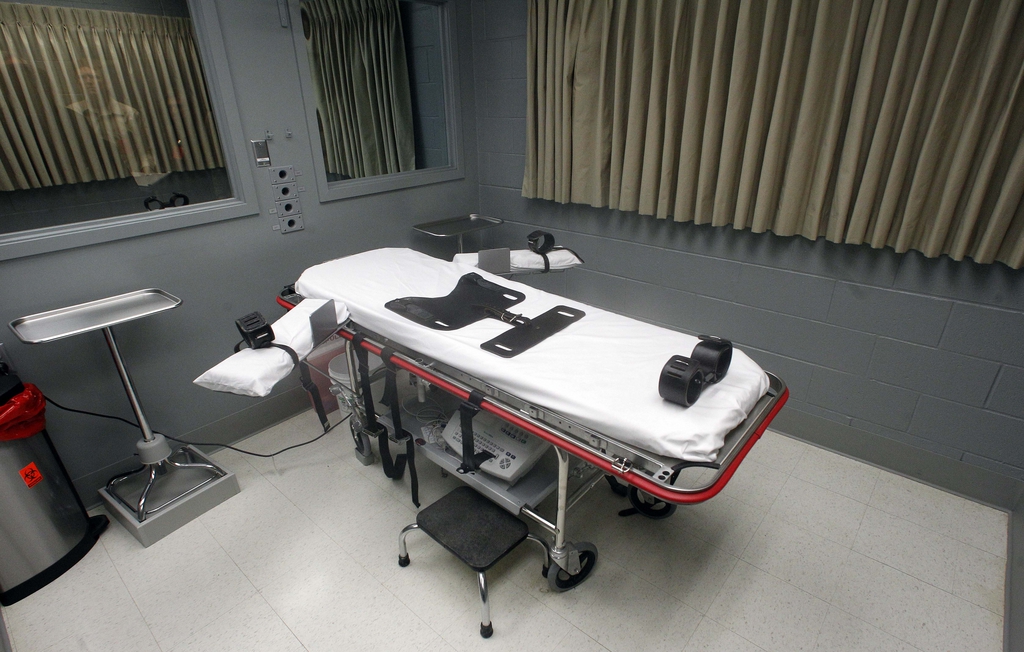Execution drugs face export restrictions

The Swiss parliament wants to prevent pharmaceutical companies from supplying drugs used for the execution of prisoners. Such exports have been restricted by the European Union since 2011.
On Monday, the Senate approved the proposal without much of a discussion, following the recommendation of its health commission. The cabinet will now work out a bill and most likely add a clause to the law on therapeutic products.
Interior Minister Alain Berset said there was currently no legal basis to ban the export of such drugs, but the medicines may become subject to a permit, requiring companies to ensure that their products are not used for executions.
The cabinet reiterated that it fundamentally backs the proposal that was originally submitted by Barbara Schmid-Federer from the centre-right Christian Democratic Party to the House of Representatives, because Switzerland is opposed to capital punishment. The House of Representatives approved the move in March.
“Switzerland is committed to respect and the enforcement of human rights,” Berset told the Senate on Monday. “The cabinet will back the move because it wants to send a strong signal to show that it supports the worldwide abolition of capital punishment.”
Capital punishment, or the death penalty, is a legal process whereby a person is put to death by the state as a punishment for a crime.
The number of confirmed executions worldwide was 682 in 2012, two more than in 2011, according to Amnesty International. Executions were recorded in 21 countries, and the number of countries where death sentences were imposed dropped from 63 to 58.
China executed thousands of people in 2011, according to the BBC, followed by Iran, Saudi Arabia, Iraq and the United States.
Since the death penalty was reinstated in the US in 1976, 1,342 convicted murderers have been executed as of August 2013, according to Steven Steward, the Clark County Prosecuting Attorney. As many as 1,165 (87 per cent) were executed by lethal injection, including 701 of the last 711 executions.
Capital punishment has, in the past, been practised by most countries. Currently, about 58 nations practise it, while 97 have abolished it. Capital punishment is forbidden by the Swiss Constitution. It was abolished from criminal law in 1942, but remained available in military law until 1992.
Practical issues
Since 2011, the European Union has required companies to obtain special permission to export drugs that may be used to execute prisoners. Because of parliament’s decision, Switzerland will now have to coordinate its legislation with that of the EU.
Health commission head Urs Schwaller, who presented to motion to the Senate, said a rejection would not be an option because it could be interpreted as support for the death penalty. At the same time, the commission said some issues remained with the practical implementation.
Berset conceded that it would be difficult to determine the exact use in every case because in most cases the anaesthetic drugs are used for therapies and only rarely for executions. At the same time, it would also not be easy to prevent the drugs being sold through intermediaries, the cabinet said.
On the one hand, the cabinet is opposed to capital punishment; but on the other, it is reluctant to act. There is no “urgent need for action”, Berset said. The cabinet instead bets on the responsible conduct of the companies because it says it cannot really be in the interests of the drugmakers to supply lethal agents used in executions.
Contribution to death penalty
There are only a few cases where Swiss companies have been linked to the supply of lethal drugs.
In 2011, it became known that Novartis unit Sandoz had supplied thiopental to the United States via an intermediary. In the same year, Basel-based drugmaker Naari reportedly supplied the same agent via an Indian intermediary to Nebraska. Both companies have repudiated the use of their agent as lethal drug.
Schmid-Federer filed her motion because, in her view, Switzerland should in no way contribute to the enforcement of the death penalty. That is why she wants to forbid the export of drugs in cases where it is discernible that they are used for the execution of humans.
Swiss law on therapeutic products already prohibits the export of drugs that are banned in the destination country or when it is clear that they may be illegally used. But as the death penalty is in fact legal in some countries, there is not really any legal basis to ban the export of such drugs.
Anaesthetics are the preferred form to execute prisoners in the more than 30 US states that allow capital punishment. The remaining prisoners were executed by the electric chair, gas chamber, hanging and firing squad.
Lethal injection is the practice of injecting a person with a fatal dose of drugs, mainly barbiturates, paralytics and a potassium solution for the purpose of causing the immediate death of the subject.
The typical anaesthesia dose for the barbiturate sodium thiopental is 0.35 grams. A lethal dose is two to five grams. Pancuronium bromide is a muscle relaxant, which paralyses the respiratory muscles, while potassium chloride is used to arrest the heart.
Lethal injections became popular at the end of the 20th century as a form of execution, replacing other methods such as electrocution, hanging, firing squad, gas chamber and beheading.
Lethal injections, which are considered less painful and more humane, are the most commonly used method in the US.
Drug shortage
Thiopental is one of the main ingredients in the drug cocktail used in lethal injections. It may also be used on its own at a higher dose.
In 2010, the only US supplier of thiopental, Hospira, stopped the production of the drug, citing unspecified problems with raw material suppliers. At the time it told customers and the US drug regulators that it planned to resume manufacture in early 2011.
But in 2011 it announced that it would not resume production of the anaesthesia agent at an Italian factory because it could not guarantee local authorities that the drug would not be used in executions. The resulting shortage of the drug led a number of US states to postpone executions. Some of them substituted thiopental with a similar product, pentobarbital, which is used in Switzerland for assisted suicide.
At the end of 2011, the EU added thiopental and similar products in its policy against torture and ill treatment, so that EU companies are only allowed to supply US hospitals with these substances with special permission. Following Hospira’s decision and change in EU policy, US states have struggled to buy the drugs abroad.

In compliance with the JTI standards
More: SWI swissinfo.ch certified by the Journalism Trust Initiative


You can find an overview of ongoing debates with our journalists here . Please join us!
If you want to start a conversation about a topic raised in this article or want to report factual errors, email us at english@swissinfo.ch.